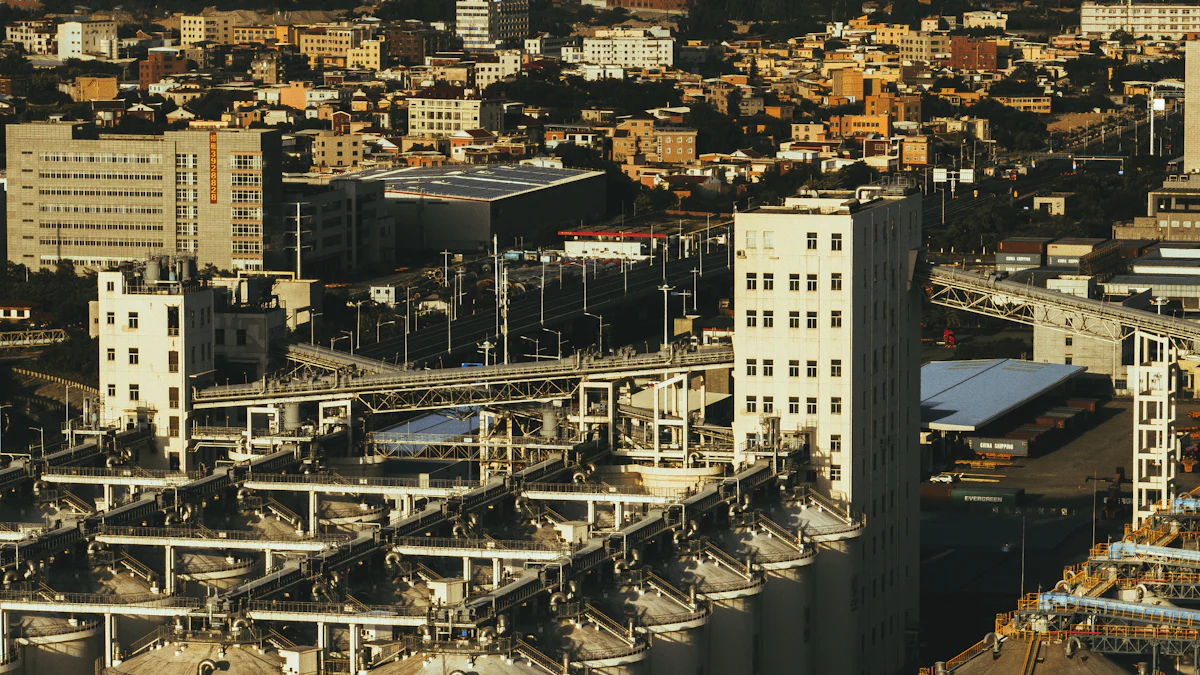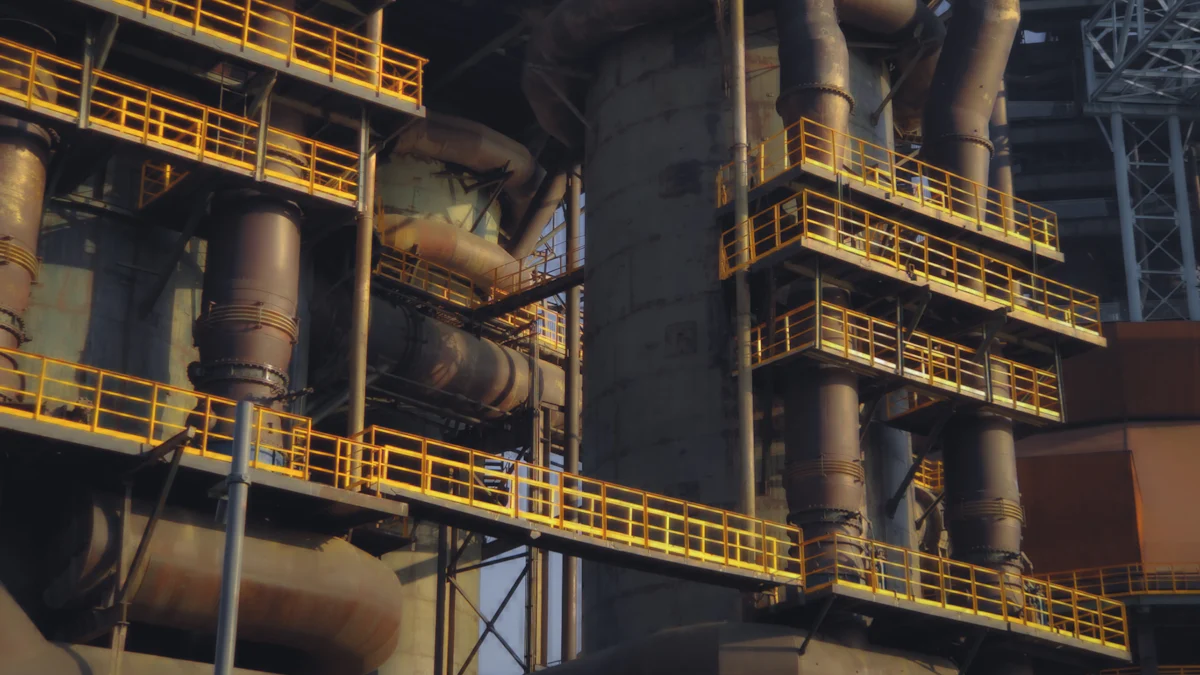Emerging Industrial Trends in Hunan to Watch in 2025

Hunan plays a vital role in China's industrial transformation. Its industries have embraced innovation to adapt to global economic shifts. Emerging trends in technology, sustainability, and advanced manufacturing are reshaping the region's economic landscape. Hunan Industry has become a leader in high-tech materials, green energy, and intelligent vehicles. These advancements position the province as a hub for cutting-edge development, attracting investment and fostering growth. By leveraging its strengths, Hunan continues to drive progress in key sectors, setting a benchmark for industrial modernization.
Key Industrial Trends in Hunan Industry in 2025

AI and Automation
Integration of AI in manufacturing and logistics
AI is transforming Hunan's manufacturing and logistics sectors. By 2025, the AI in global manufacturing market is expected to grow to $8.57 billion, up from $5.94 billion in 2024, reflecting a remarkable CAGR of 44.2%. This rapid growth highlights the increasing adoption of AI applications across industries. Factories in Hunan are leveraging AI to optimize production lines, reduce waste, and enhance efficiency. Logistics companies are also integrating AI-powered systems to streamline supply chains and improve delivery accuracy. These advancements demonstrate how AI is driving innovation and reshaping industrial operations in the region.
Expansion of robotics in traditional and emerging industries
Robotics is playing a pivotal role in both traditional and emerging sectors in Hunan. Industries such as automotive and electronics are deploying robots to perform repetitive tasks with precision, boosting productivity. Emerging sectors like renewable energy are also benefiting from robotics, particularly in the assembly of solar panels and wind turbines. The expansion of robotics reflects Hunan's commitment to technological innovation and its focus on maintaining competitiveness in global markets.
Green Energy and Sustainability
Growth of solar and wind energy projects in Hunan
Hunan is embracing sustainability as a core strategy by investing heavily in green energy. The province has launched several large-scale solar and wind energy projects to meet its renewable energy goals. These projects aim to reduce reliance on fossil fuels and promote cleaner energy sources. By prioritizing renewable energy, Hunan is positioning itself as a leader in sustainability and environmental stewardship.
Development of energy storage and green industrial bases
Energy storage technologies are critical to supporting Hunan's green energy initiatives. Companies like Hunan GCE Technology Co., Ltd. are developing advanced Battery Management Systems (BMS) that enhance battery safety, optimize energy usage, and extend battery life. Additionally, Hunan Yuneng is building a lithium battery cathode material production facility to strengthen local production and improve energy storage efficiency. These developments are fostering innovation in energy storage and enabling the integration of renewable energy into the grid. Green industrial bases are also emerging across the province, further solidifying Hunan's commitment to sustainability.
Advanced Manufacturing and High-Tech Materials
Emergence of smart factories and precision engineering
Advanced manufacturing is revolutionizing Hunan's industrial landscape. Smart factories equipped with IoT and AI technologies are enabling precision engineering and efficient production processes. These factories use real-time data to monitor operations, reduce downtime, and improve product quality. The adoption of advanced manufacturing techniques is enhancing Hunan's global competitiveness and attracting significant investment in high-tech industries.
Zhuzhou Keneng's leadership in high-purity metal refining
Zhuzhou Keneng has emerged as a leader in high-tech materials, particularly in high-purity metal refining. The company specializes in purifying rare metals like indium and gallium to meet the stringent requirements of advanced manufacturing. In 2023, Zhuzhou Keneng held a domestic market share of 47% for high-purity indium and 21% for high-purity gallium. This leadership underscores Hunan's strength in high-tech materials and its ability to support cutting-edge industries.
Digital Transformation and IoT
Adoption of IoT in industrial operations and supply chains
Hunan industry is undergoing a significant digital transformation, with IoT playing a central role in reshaping industrial operations and supply chains. IoT applications are enhancing efficiency and driving innovation across various sectors. Key applications include quality control, predictive maintenance, and energy management. These technologies enable factories to monitor equipment in real-time, reducing downtime and improving productivity. Supply chain traceability and asset tracking are also becoming more streamlined, ensuring better transparency and reliability. By integrating IoT, industries in Hunan are achieving sustainable and green development while optimizing overall supply chain efficiency. This shift reflects the region's commitment to smart manufacturing and technological innovation.
Expansion of e-commerce and digital infrastructure
The rapid growth of e-commerce in Hunan is transforming the local economy. Investments in digital infrastructure are enabling businesses to expand their reach and improve customer experiences. High-speed internet and 5G networks are supporting the development of online platforms, making it easier for companies to connect with global supply chains. Local production facilities are leveraging these advancements to enhance their competitiveness in high-tech sectors. Cybersecurity measures are also being strengthened to protect sensitive data and ensure safe transactions. These developments highlight the importance of digital transformation in driving growth and fostering innovation in 2025.
Autonomous Driving and Intelligent Vehicles
Hunan's focus on commercial vehicle autonomous driving
Hunan is emerging as a leader in the autonomous driving sector, particularly in commercial vehicles. The province has chosen to focus on this differentiated track due to its potential for practical applications. Autonomous commercial vehicles, such as unmanned mining trucks and logistics vehicles, are being deployed in controlled environments like industrial parks and mining sites. These vehicles benefit from reduced pedestrian and non-motorized traffic, simplifying the development of perception and decision-making systems. This approach aligns with Hunan's strategy to capitalize on emerging sectors and establish itself as a hub for advanced manufacturing and high-tech innovation.
Changsha's role as a hub for intelligent connected vehicles
Changsha is playing a pivotal role in advancing intelligent connected vehicles in Hunan. The city is home to Xidi Zhijia, a prominent company specializing in autonomous driving technology. This firm develops solutions for unmanned transportation scenarios, including pure electric mining trucks and park logistics vehicles. Changsha's infrastructure supports the integration of C-V2X technology, which connects vehicles, roads, and cloud systems. These advancements are positioning the city as a key player in the trillion-dollar intelligent vehicle market. By fostering innovation and attracting investment, Changsha is driving the growth of Hunan's high-tech sectors and contributing to the region's global competitiveness.
Regional Impact of Emerging Trends in Hunan Industry

Economic Growth and Investment
Increased GDP contribution from high-tech and green industries
The rapid adoption of advanced technologies and renewable energy projects is driving economic growth in Hunan. By 2025, high-tech industries and green energy initiatives are expected to contribute significantly to the province's GDP. These sectors are creating new revenue streams and reducing reliance on traditional manufacturing. The focus on sustainability as a core strategy is also attracting global attention, positioning Hunan as a leader in innovative industrial practices. This shift highlights the region's ability to adapt to changing market demands and embrace emerging trends.
Role of the Hunan Strategic New Industry Fund in driving investments
The Hunan Strategic New Industry Fund plays a pivotal role in fostering investment in key sectors. With a capital contribution of 10 billion yuan, the fund supports projects in high-tech manufacturing, renewable energy, and other strategic industries. It aims to bring one to two major projects to Hunan annually, boosting local production and strengthening the province's industrial base. This initiative not only accelerates economic growth but also enhances Hunan's competitiveness in the global supply chain. By prioritizing innovation and sustainability, the fund ensures long-term development for the region.
Workforce Transformation
Rising demand for skilled labor in AI, green energy, and advanced manufacturing
The rise of AI, green energy, and advanced manufacturing is reshaping the labor market in Hunan. By 2025, industries will require a highly skilled workforce to operate and maintain cutting-edge technologies. Jobs in AI development, renewable energy systems, and precision engineering are expected to see significant growth. This demand underscores the importance of equipping workers with the necessary skills to thrive in a rapidly evolving industrial landscape.
Upskilling initiatives and educational reforms to meet industry needs
Hunan is implementing upskilling initiatives and educational reforms to address the growing demand for skilled labor. Training programs focus on AI, green energy, and high-tech manufacturing, ensuring workers are prepared for future challenges. Partnerships between industries and educational institutions are fostering innovation and creating a talent pipeline for emerging sectors. These efforts are vital for maintaining Hunan's position as a leader in industrial modernization and sustainability.
Global Competitiveness
Hunan's position in global supply chains for high-tech products
Hunan is strengthening its role in global supply chains by producing high-tech products like advanced materials and intelligent vehicles. Companies in the region are leveraging local production capabilities to meet international standards. This return of local production enhances efficiency and reduces dependency on external suppliers. By focusing on innovation and quality, Hunan is solidifying its reputation as a reliable partner in the global market.
Export growth in new energy vehicles and advanced materials
Exports of new energy vehicles and advanced materials are driving Hunan's global competitiveness. By 2025, the province aims to expand its presence in international markets through strategic investments and partnerships. Strengthening cybersecurity measures ensures the safety of sensitive data during export operations. These efforts reflect Hunan's commitment to fostering sustainable growth and maintaining its leadership in high-tech industries.
Challenges and Opportunities in Hunan Industry
Challenges
Infrastructure gaps in rural and less-developed areas
Hunan's rapid industrial growth has highlighted disparities in infrastructure development between urban centers and rural regions. Many less-developed areas lack the necessary transportation networks, digital connectivity, and energy infrastructure to support industrial expansion. These gaps hinder the equitable distribution of economic benefits and limit the potential for local production in these regions. Addressing these challenges requires targeted investments in infrastructure to bridge the urban-rural divide and unlock the full potential of the Hunan industry.
Balancing rapid industrial growth with environmental sustainability
The pace of industrial modernization in Hunan presents challenges in maintaining environmental sustainability. Industrial activities often strain natural resources and contribute to pollution. To address this, stakeholders are adopting sustainable practices to minimize environmental impact.
Governments, industries, and research institutions are collaborating to develop green technologies.
Policymakers are ensuring that sustainable initiatives remain inclusive and equitable.
Companies are prioritizing renewable energy sources and sustainable technology innovation to reduce their carbon footprint.
These efforts aim to balance economic growth with environmental preservation, ensuring long-term sustainability for the region.
Opportunities
Government incentives for innovation and green energy projects
Hunan's government is actively fostering innovation through financial incentives and policy support. The establishment of the Hunan Strategic New Industry Fund, with a capital contribution of 10 billion yuan, exemplifies this commitment. This fund supports projects in renewable energy, high-tech manufacturing, and other strategic sectors. By encouraging investment opportunities in green energy and industrial automation markets, the government is driving the transition toward a more sustainable economy. These initiatives position Hunan as a leader in renewable energy and industrial modernization, attracting global attention and fostering economic growth.
Collaboration with international tech firms and investors to boost industrial growth
Hunan's focus on global partnerships creates significant investment opportunities. Collaborations with international tech firms bring advanced technologies and expertise to the region, accelerating industrial growth. For example, partnerships in the healthcare sector and intelligent vehicle development are enhancing innovation and competitiveness. Strengthening cybersecurity measures ensures the safety of sensitive data during these collaborations. This approach not only boosts Hunan's global competitiveness but also supports the return of local production, further solidifying its position in global supply chains.
Hunan's industrial transformation in 2025 showcases remarkable advancements in AI, green energy, and high-tech manufacturing. These trends are reshaping the region's economy and creating substantial opportunities for businesses and investors. For instance, Hunan Zhongke Electric Co., Ltd. has seen increased institutional ownership, reflecting investor confidence. Similarly, Hunan Aihua Group's projected revenue growth and consistent dividends make it an attractive option for income-focused investors.
The province's focus on renewable energy and cybersecurity innovation further strengthens its global competitiveness. By fostering innovation and sustainability, Hunan is poised to lead China's industrial future, setting a benchmark for economic modernization.
See Also
Understanding Organic Coating And Its Eco-Friendly Advantages
Leading Aluminum Label Trends Across US, EU, And China
Importance of Metal Substrates in Today’s Industrial Sector
A Supplier's Guide to CBAM and Sustainable Casting Practices
Seven Essential Steps to Collaborate With Global Diecast Factories
About Hunan Puka
Established in 2016 and based in Hunan, China, with a liaison point in Berlin, we are a Tier 2 supplier for the automobile industry. We specialize in the production of customized aluminum die-casting parts designed for machines with a closing force ranging from 280 to 800 tons, with subsequent manufacturing process CNC machining and surface treatment. Our commitment to quality is reflected in our accredited quality management system, certified by ISO9001:2015 and IATF16949:2016 standards.


